The Hunt Institute Convenes Legislators to Talk Education Policy
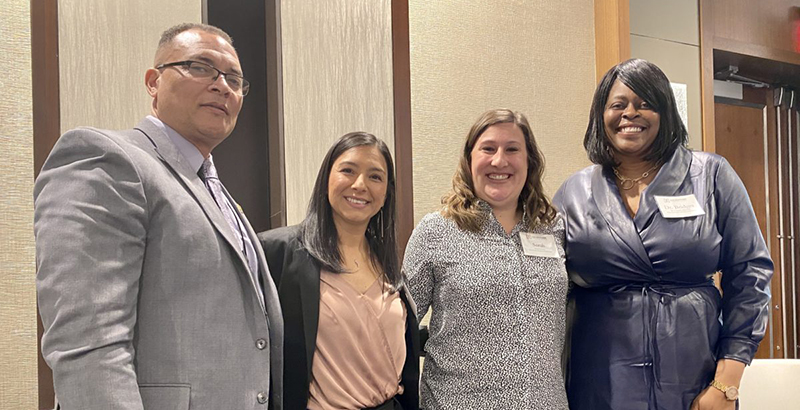
Get stories like this delivered straight to your inbox. Sign up for The 74 Newsletter
For 19 years, since 2003, The Hunt Institute has hosted the Holshouser Legislators Retreat to engage policymakers “in an open and constructive dialogue about important education issues facing our state.” Guiding questions framed each session, which this year focused on five issues: the early childhood workforce, supporting access for completion for adult learners, retaining excellent educators and leaders, early career exploration, and strengthening the pipeline to postsecondary education.
Held at the JB Duke Hotel in Durham on March 27-28, 2022, this year the retreat was co-chaired by Sen. Deanna Ballard, R-Watagua; Rep. Ashton Clemmons, D-Guilford; Sen. Don Davis, D-Greene; Rep. Jon Hardister, R-Guilford; and Sen. Michael Lee, R-New Hanover.
Sam Houston, interim chair of The Hunt Institute, welcomed the legislators, noting that “our education and the economy are one and the same.”
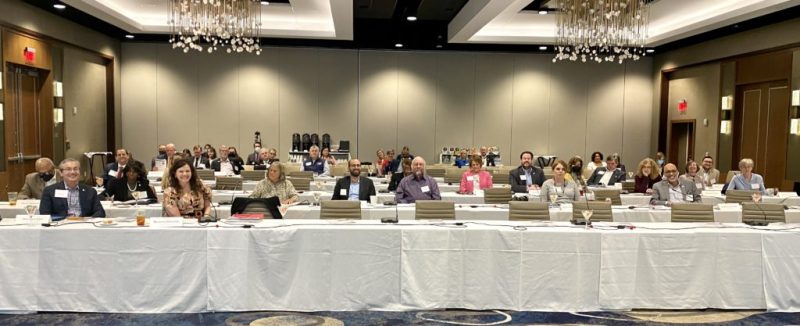

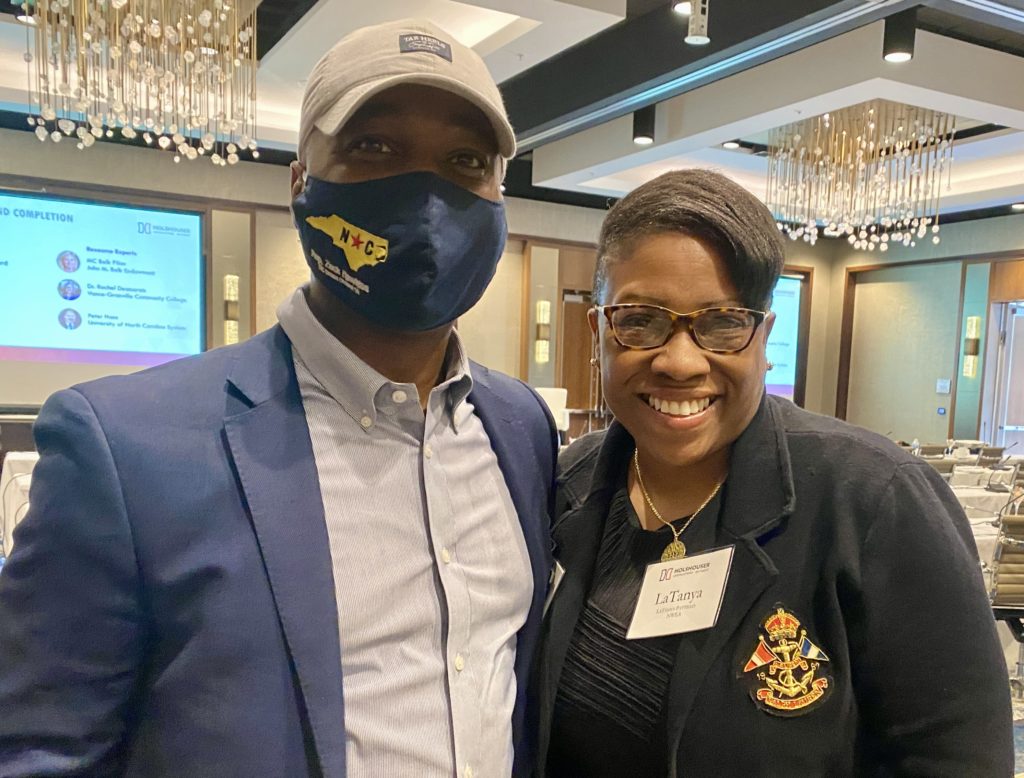
Who are North Carolina’s learners?
Dr. Lynn Moody kicked off the retreat with a conversation on trends in student demographics and how schools partner with families. The panel included Francelia Burwell, the president of the NC PTA, and Dr. Mike Swan, the superintendent in Burke County Schools. That’s me in there too.
Burwell said, “relationships and building trust is what is important.” She shared the National PTA’s standards for successful family-school partnerships, including welcoming all families into the school community, communicating effectively, supporting student success, speaking up for every child, sharing power, and collaborating with the community.
Under Swan’s leadership, Burke County Schools is leading the way nationally on engaging families with the help of parent educators, like Mr. Ted Pedro. “During the pandemic, we had one student unaccounted for within our system,” said Swan. “One.”
North Carolina’s early childhood workforce
A rock star panel of early childhood education leaders talked with legislators about building and sustaining a pipeline of well-compensated, excellent early childhood educators across North Carolina.
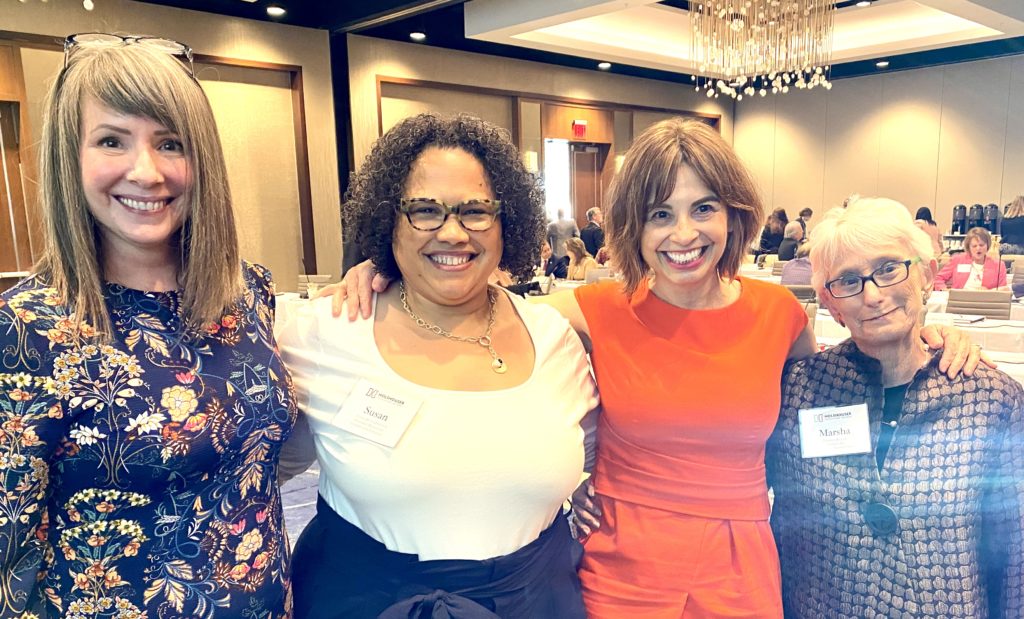
“It’s a broken market,” said Karen McKnight, deputy director for early learning programs with The Hunt Institute. The issue brief for the retreat explained, “the early childhood workforce has long been under-valued and under-paid.” Down from 41,000 educators prior to the pandemic, this workforce now consists of 37,000 professionals across 5,600 public and private child care and early education settings.
“It’s all about compensation, compensation, compensation,” said Marsha Basloe with Child Care Services Association, noting the need to balance the cost of living and the demands of the work. “It’s really very hard to take care of young children every day.”
Policymakers had the opportunity to follow up in small group conversations with early childhood providers, which ended with legislators offering them a standing ovation.
This session’s guiding questions included:
- How can the state provide benefits for the early childhood workforce to recruit qualified educators?
- How can North Carolina build upon current programs, such as WAGE$, AWARDS, T.E.A.C.H. and stabilization grants to retain early child care teachers?
- What are additional structures and incentives that the state can explore to encourage entry into the early childhood workforce?
Supporting access and completion for adult learners
“We’ve got to ask if colleges are student-ready in addition to asking if students are college-ready,” said Winn Decker with The Hunt Institute, moderating a panel with MC Belk Pilon with the John M. Belk Endowment; Rachel Desmarais, president of Vance-Granville Community College; and Peter Hans, president of the UNC System.
In pursuit of the state’s 2030 state attainment goal, North Carolina, according to the retreat’s issue brief, is working to increase postsecondary access for adult learners, particularly those with some college and no degree. State initiatives include NC Promise and Finish Line Grants to increase affordability; NC Reconnect, a pilot program to recruit adult learners at 10 of our community colleges; student support wraparound services; and Project Kitty Hawk, a $97 million investment to recruit, retain, and support adult learners to the state’s public four-year institutions.
“Who are our adult learners?” asked Belk Pilon. “How do we service them? Who is servicing them? Are they being serviced?”
Community colleges are working to identify our 1.3 million adult learners to “increase enrollment, completion, and workforce connections,” she said. “The bottom line is we are all stronger together.”
Desmarais said, “Life happened to them, but they are our students.”
This session’s guiding questions included:
- How do the unique needs of adult learners impact their access to postsecondary education?
- How can policymakers and educators effectively engage adult learners in North Carolina’s efforts to increase educational attainment?
- What resources and support systems can the state leverage to ensure adult learners can persist through college and attain a credential?
Retaining excellent educators and leaders
Alfred Mays with Burroughs Wellcome Fund moderated a panel on policies and practices to support an excellent and diverse educator workforce, including Dr. Valerie Bridges, superintendent of Edgecombe County Public Schools; Sarah Estes, principal, Virginia Cross Elementary in Chatham County Schools; and Emily Francis, an ESL teacher in Cabarrus County Schools. Bridges is North Carolina’s superintendent of the year.
Francis said students and teachers need a sense of belonging, a space to lift up their voices, and access to resources. “Honor my expertise,” Francis asked legislators.
“Educators are feeling really stressed,” Estes said. She talked with legislators about grow your own programs for teachers, the importance of competitive pay, and taking a fresh look at the accountability model.
Bridges said, “Great leaders want autonomy.” She advocated for discretion at the district level to pay leaders, restart status, performance-based assessments, and rethinking the role of principals.
This session’s guiding questions included:
- What do excellent and diverse teachers need from the state to thrive and stay in the classroom?
- What additional data should the state collect to provide a full picture of who is leaving the profession and why?
- How can North Carolina build upon previous successes, such as the high number of National Board Certified teachers and the Advanced Teaching Roles pilot, to retain teachers in the classroom?
Early career exploration
Legislators in this session discussed how to promote career exploration and workforce development earlier in our student’s education since “research shows that middle school is a prime opportunity to protect elementary learning gains and set students up for continued success in high school, postsecondary attainment, and the workforce.”
Caroline Sullivan, executive director for N.C. Business Committee for Education moderated this panel, including Michelle Lair with the N.C. Community College System and Trey Michael with the N.C. Department of Public Instruction.
Sullivan said, “work-based learning provides relevance to the curriculum.”
This session’s guiding questions included:
- How can North Carolina increase interest and improve outreach to students and families about career exploration opportunities, such as CTE programming and apprenticeships?
- How can North Carolina expand on existing high school career exploration and workforce training programs to engage middle school students?
- How can we ensure consistency and alignment around opportunities to engage middle school students across schools in North Carolina?
Strengthening the pipeline to postsecondary education
Efforts to improve equitable access to postsecondary education were discussed in a session with Andrea Poole, executive director of the NC State Education Assistance Authority, and Pat Sturdivant, executive director of Capital Area Workforce Development.
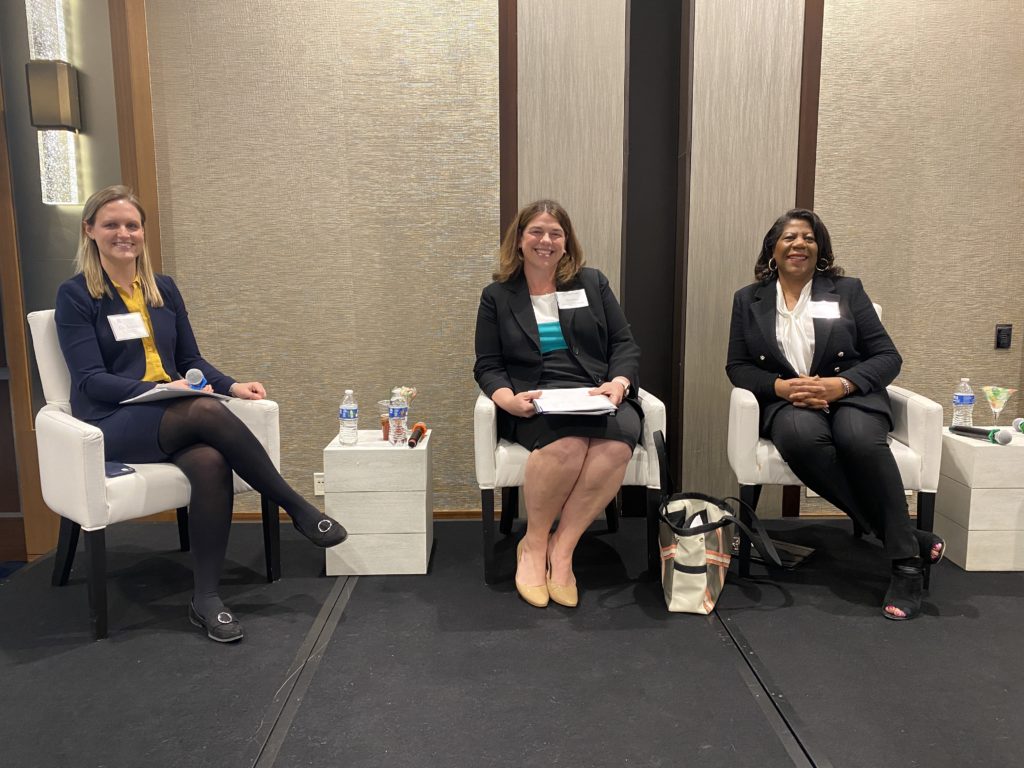
“Help completing the FAFSA,” is priority #1, said Poole. “It is a complicated document.” FAFSA is the Free Application for Federal Student Aid.
Our state aspires to be first in the nation in FAFSA completion, and MyFutureNC has a statewide goal for 2021-22 of 65% FAFSA completion. Here is a step-by-step guide to filling out the FAFSA. Here is North Carolina’s FAFSA tracker.
This session’s guiding questions included:
- How can North Carolina utilize its postsecondary financial levers to ensure that students with the most need are accessing higher education?
- Workforce development opportunities often act as a catalyst for students access and attaining a postsecondary credential or credentials. What support is needed at the middle school and high school level to increase opportunities and to encourage participation?
- How have the demographics of postsecondary students changed over the last several decades? How does this change the way we support students today?
The Hunt Institute’s legislators retreats
“Our State Legislators Retreat model, which started in North Carolina and was developed by Governor Jim Hunt and Senator Howard Lee, is one of The Hunt Institute’s flagship programs,” said Dr. Javaid Siddiqi, president and CEO of The Hunt Institute. “We aim to provide policymakers from across the state with dedicated time to engage in critical conversations and learn from each other to support positive impacts on public education.”
This article first appeared on EducationNC and is republished here under a Creative Commons license.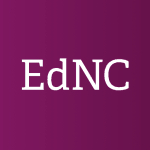
Editor’s Note: Sam Houston and Emily Francis serve on the EdNC Strategic Council. The John M. Belk Endowment supports the work of EdNC.
Get stories like these delivered straight to your inbox. Sign up for The 74 Newsletter

;)